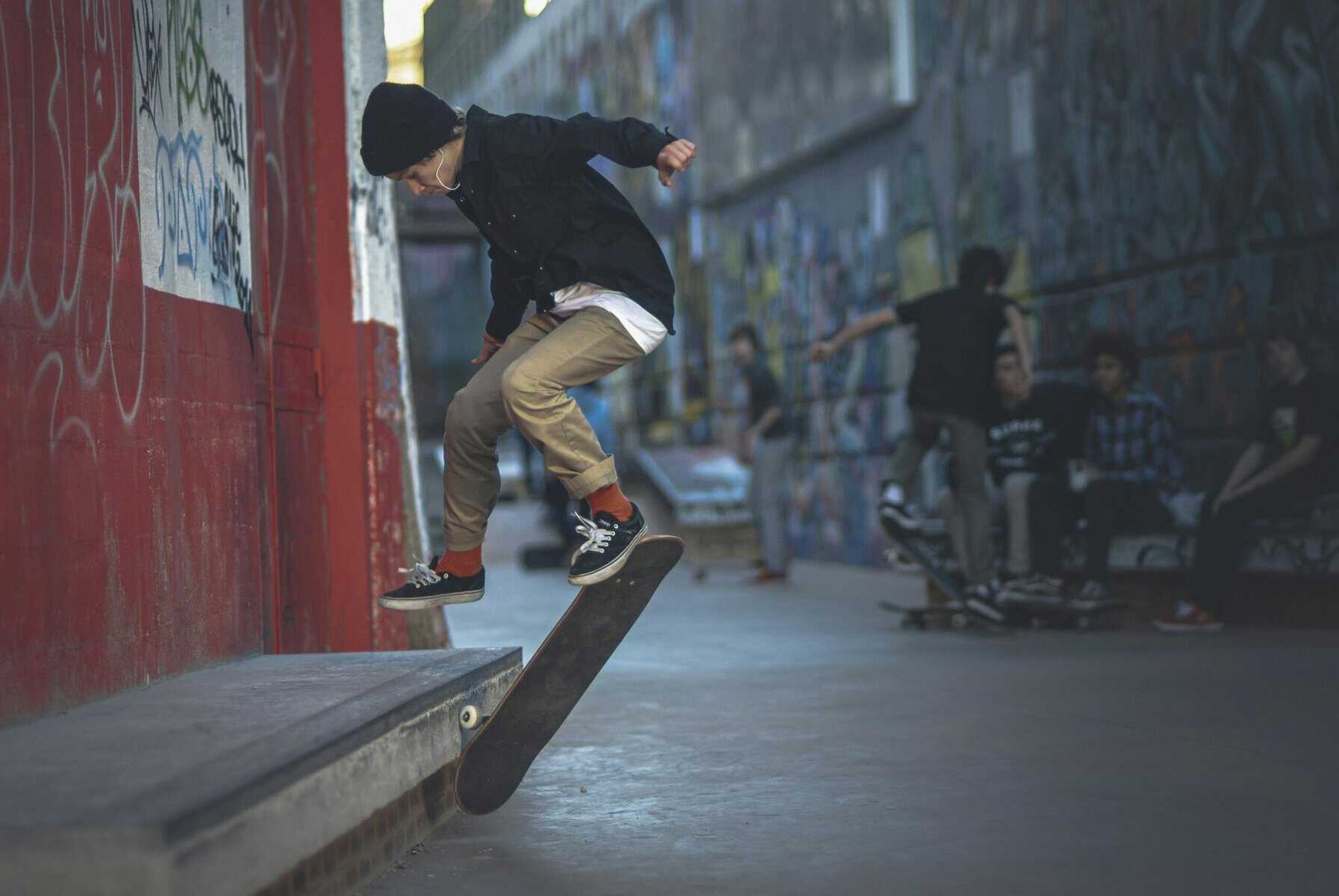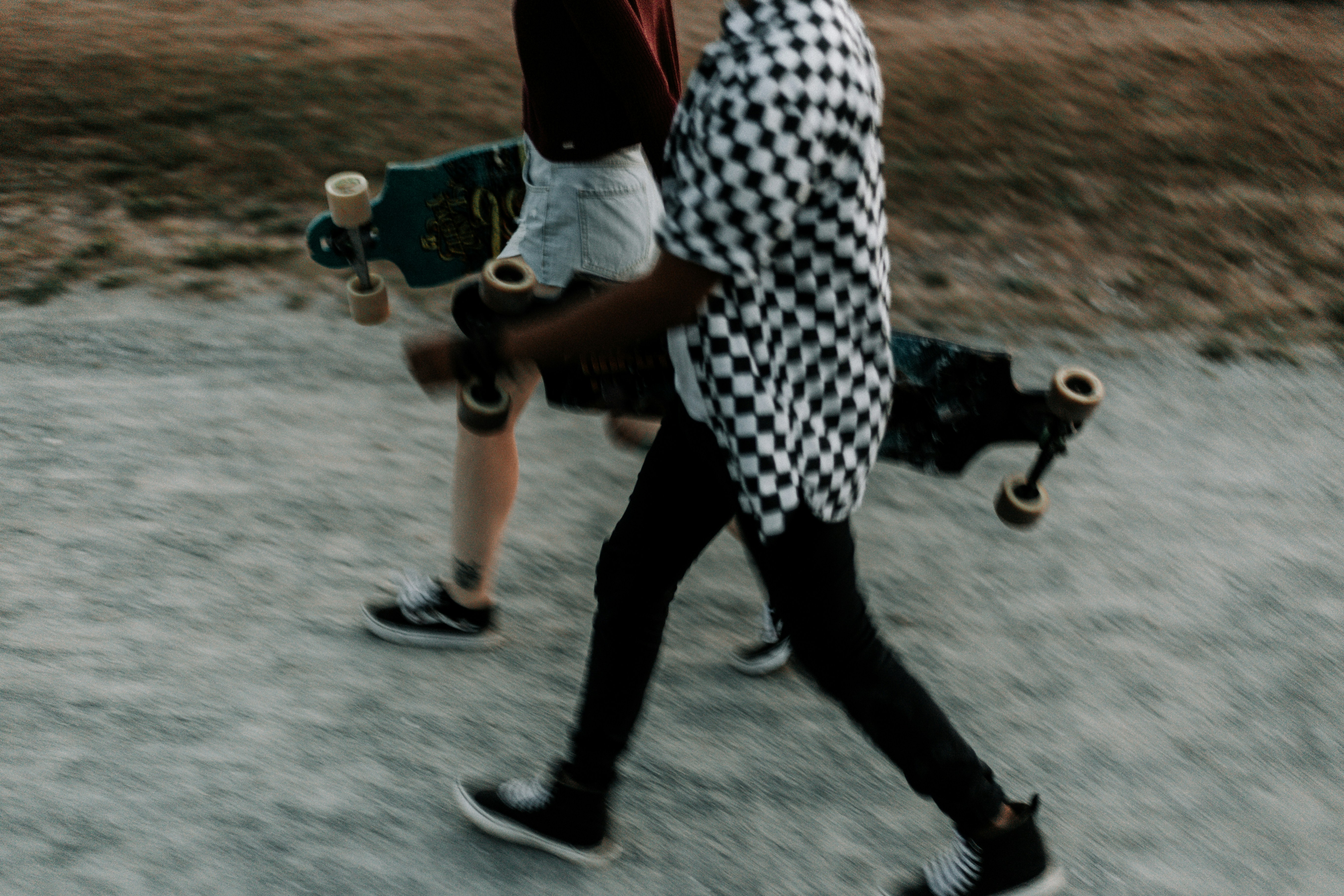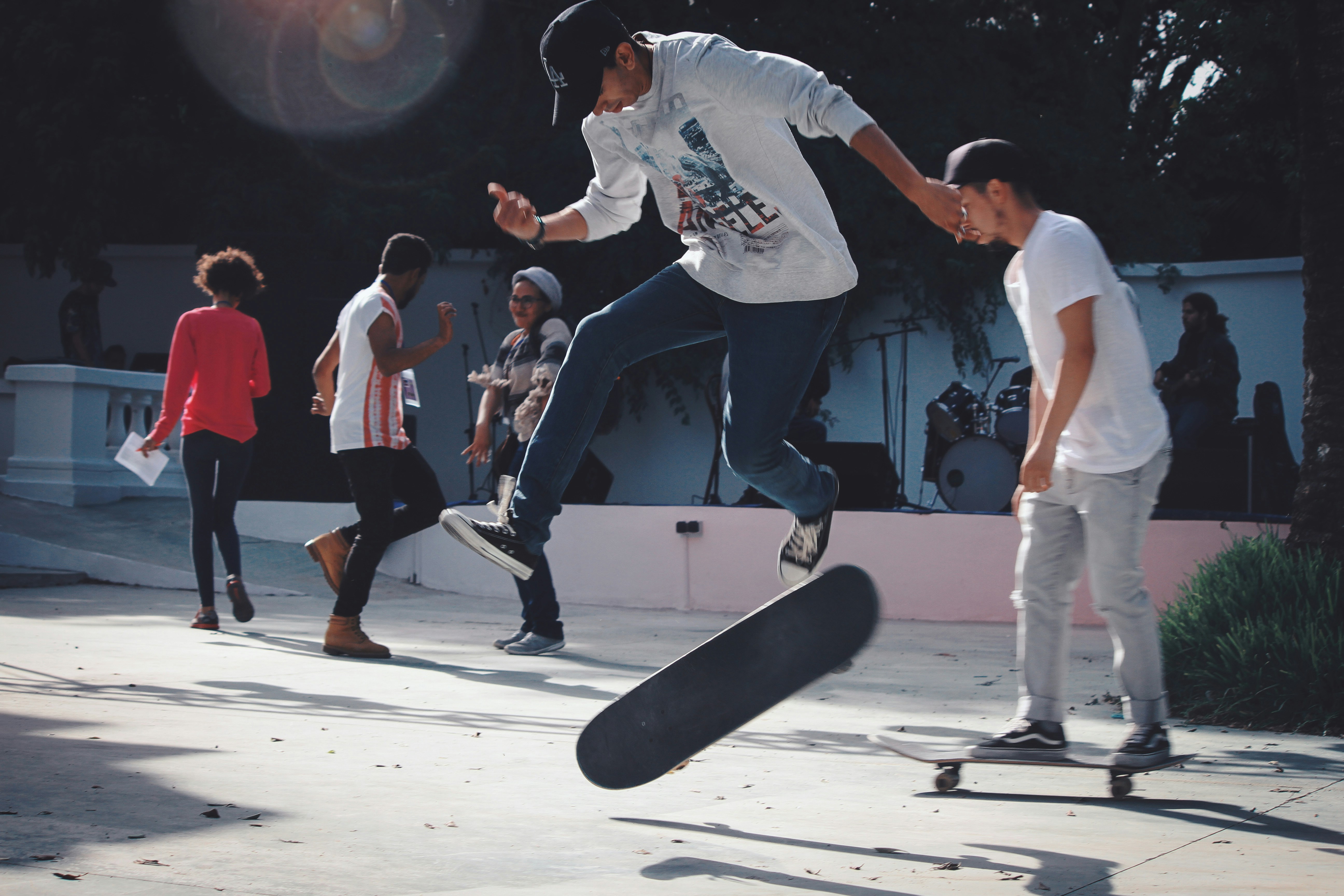Imagine a world where skateboarding becomes more than just a hobby, where it becomes a tool for shaping the minds and lives of young individuals. In this article, we will explore the profound impact that skateboarding can have on youth development and confidence. It is a journey that takes us through the physical and mental benefits, the sense of community it fosters, and the life lessons it imparts. So, brush off your board and join us as we embark on this exhilarating exploration of the transformative power of skateboarding.
Physical Development
Skateboarding is not just a cool sport; it’s also a great way to improve your balance and coordination. When you ride a skateboard, you need to maintain your balance while performing tricks and maneuvers. This constant practice of balancing helps to strengthen the muscles in your legs, core, and even your arms. As you become more skilled in skateboarding, your coordination also improves, as you learn to synchronize your movements to maintain control and achieve specific tricks. In addition, skateboarding requires stamina and endurance, as you engage in continuous movement and physical exertion. Constantly pushing yourself to skate for longer periods and tackle challenging tricks can significantly increase your strength and endurance levels.
Skateboarding is also beneficial for enhancing motor skills. By maneuvering the skateboard, you develop fine motor skills, as you learn to control the board with precision. This involves using your feet to steer, balance, and manipulate the skateboard, which strengthens the neural pathways between your brain and muscles. Through regular skateboarding practice, you can refine your gross motor skills, such as jumping, turning, and flipping the skateboard. These skills not only contribute to your overall physical development but also have positive impacts on other areas of your life, such as improving your hand-eye coordination and overall motor control.
Mental Development
Skateboarding challenges your mind and boosts problem-solving skills. Every time you approach an obstacle or attempt a new trick, you need to analyze the situation, assess the risks involved, and come up with a strategy to overcome the challenge. This process of problem-solving and critical thinking helps to improve your cognitive abilities, as you learn to evaluate different options, anticipate potential outcomes, and make quick decisions in a dynamic environment. Moreover, skateboarding fosters creativity and self-expression, allowing you to explore different ways of approaching tricks and maneuvers. It encourages you to think outside the box, come up with unique combinations of movements, and express your individuality through your skateboarding style.
Skateboarding also promotes perseverance and resilience. As any skateboarder knows, it takes time and effort to master new tricks. You will inevitably fall and fail multiple times before successfully landing a trick or conquering a challenging obstacle. However, with every failure and subsequent attempt, you learn to persevere, persist through adversity, and develop resilience. This resilience extends beyond the skate park and becomes a valuable life skill, as you become more resilient in dealing with setbacks, challenges, and obstacles in various aspects of your life. Whether it’s in school, work, or personal endeavors, skateboarding teaches you to never give up and keep pushing forward despite difficulties.
Social Development
Skateboarding is not just a solitary activity; it also provides numerous opportunities for building teamwork and collaboration skills. Skateparks are often filled with other skateboarders who share the same passion for the sport. Collaborating with fellow skateboarders to create lines and perform tricks together fosters teamwork and cooperation. It encourages you to communicate and coordinate your movements with others, creating synchronized and visually stunning routines. Through this teamwork, you not only learn to work well with others but also develop a sense of camaraderie and support within the skateboarding community.
Furthermore, skateboarding encourages communication and social interaction. Whether it’s discussing new tricks, sharing tips, or simply cheering each other on, the skateboarding community is a vibrant and welcoming space for socializing. Engaging in conversations with other skateboarders allows you to exchange knowledge and experiences, broadening your understanding of the sport and fostering connections with like-minded individuals. The sense of community within the skateboarding world is strong, and it provides a platform for forming friendships and establishing valuable social networks.
Skateboarding also promotes a sense of community and inclusivity. Skateparks are often inclusive spaces where people from all backgrounds and skill levels come together to enjoy the sport. Regardless of age, gender, ethnicity, or social status, skateboarding welcomes everyone. This inclusivity helps break down social barriers and promotes a sense of belonging, creating a supportive and accepting environment for youth to develop both socially and emotionally.
Emotional Development
Skateboarding has a profound impact on emotional development, contributing to increased self-confidence and self-esteem. When you successfully land a difficult trick or conquer a challenging obstacle, it fills you with a sense of accomplishment and boosts your self-confidence. The constant progression and improvement in skateboarding provide tangible evidence of your capabilities, leading to a positive self-image and belief in your own abilities. This confidence extends beyond the skatepark and becomes a valuable asset in other aspects of your life, empowering you to take on new challenges and overcome obstacles with resilience.
In addition to self-confidence, skateboarding enhances emotional intelligence and self-awareness. The act of skateboarding requires you to be in tune with your emotions, as it involves managing fear, frustration, and excitement. Exploring your emotional landscape while skateboarding helps you develop a deeper understanding of your own feelings, enabling you to regulate your emotions effectively and make more conscious choices. Skateboarding also provides a healthy outlet for stress and pent-up emotions. When you step on your skateboard, you have the opportunity to release stress and redirect negative emotions into productive physical activity, promoting mental well-being and emotional balance.

Risk Assessment and Decision Making
Skateboarding improves your risk assessment skills and enhances critical thinking and decision-making abilities. Every time you approach a new trick or obstacle, you need to assess the risks involved and make split-second decisions. Evaluating factors such as speed, distance, height, and potential hazards requires you to think critically and make calculated choices. These risk assessment skills are transferable to other areas of your life, allowing you to make informed decisions and assess potential consequences before taking action.
Moreover, skateboarding encourages responsible behavior and teaches you about the importance of consequences. In skateboarding, taking unnecessary risks without considering the consequences can result in injury or failure. This understanding of consequences encourages responsible behavior, as you learn to make choices that prioritize your safety and well-being. Learning to analyze risks and make responsible decisions prepares you for navigating real-life situations, where wise decision-making is crucial for your personal development and success.
Cognitive Skills
Skateboarding enhances focus and concentration. When you are on your skateboard, you need to stay fully present and focused on the task at hand. The need to stay attentive, focused, and react quickly to external stimuli helps improve your ability to concentrate and sustain attention. This sharpened focus is a valuable skill in various aspects of life, whether it’s at school, work, or any other activity that requires concentration.
Skateboarding also improves spatial awareness and perception. To execute tricks successfully, you need to be aware of your body’s position in space, accurately estimate distances, and have a keen sense of spatial orientation. These spatial awareness skills develop through practice and can enhance your overall perception and understanding of the physical world. Additionally, skateboarding develops problem-solving and strategic thinking. As you approach obstacles and tricks, you need to strategize the best approach, analyze the environment, and come up with the most efficient plan. This lateral thinking and problem-solving skills are transferrable to other areas of your life, helping you tackle challenges and find innovative solutions.
Confidence Building
Skateboarding provides numerous opportunities for overcoming challenges and mastering new tricks. Every time you attempt a trick, whether it’s a simple ollie or a complex kickflip, you push yourself out of your comfort zone and strive for improvement. With each successful attempt, you build a sense of achievement and competence, fueling your motivation to continue progressing. The process of overcoming challenges and mastering new tricks boosts your self-confidence, as you realize your own potential and capabilities. The confidence gained through skateboarding spills over into other areas of your life, empowering you to take on new challenges and pursue your goals with determination.
Positive social recognition and peer support also contribute to confidence building in skateboarding. The skateboarding community is known for its supportive and encouraging nature. When you land a difficult trick or achieve a personal milestone, fellow skateboarders provide positive feedback, acknowledging your achievements. This recognition from your peers not only boosts your self-esteem but also reinforces your sense of belonging within the skateboarding community. The support and encouragement from others foster a nurturing environment for individual growth and confidence building.
Individual Expression
Skateboarding offers a unique avenue for individual expression. Within the sport, there is ample room for creativity and personal style. Each skateboarder brings their own flair to tricks and maneuvers, infusing them with their personality and unique approach. Whether it’s through the execution of tricks, the way you dress, or even the design of your skateboard, skateboarding allows you to develop a distinct style and identity. This freedom of expression is liberating, as it encourages you to embrace your individuality and express yourself authentically.
Moreover, skateboarding intersect with artistic elements. Through tricks and maneuvers, skateboarders often incorporate creative and artistic movements, adding an aesthetic dimension to the sport. The rhythm, flow, and visual appeal of skateboarding can be likened to an art form, as each trick becomes a canvas for self-expression. Skateboarding provides a medium for exploring different artistic elements, such as rhythm, coordination, body movement, and overall aesthetic, allowing you to tap into your creative side and express yourself artistically.

Goal Setting and Discipline
Skateboarding fosters goal setting and discipline. As a skateboarder, you often set personal goals, whether it’s landing a specific trick, conquering a challenging obstacle, or improving your overall skill level. These goals provide a sense of direction and motivation, as you work towards achieving them through consistent practice and dedication. Skateboarding teaches the importance of discipline and maintaining a regular practice routine. Progressing as a skateboarder requires perseverance and diligence, as you need to commit to regular practice sessions and consistently push yourself to improve. By setting and achieving goals in skateboarding, you develop discipline and the ability to work towards long-term objectives in other areas of your life.
In addition, skateboarding emphasizes the importance of practice and perseverance. It’s common knowledge among skateboarders that landing a trick requires countless attempts and failures. The process of practicing the same trick over and over again until you finally achieve it teaches resilience, patience, and the value of persistence. These qualities are essential for personal development, as they enable you to navigate challenges, setbacks, and failures in other aspects of your life. Skateboarding becomes a vehicle for cultivating a growth mindset and instilling the belief that success is a result of persistent effort and dedication.
Community Engagement
Skateboarding offers various opportunities for community engagement. Participating in skateboarding events and competitions allows you to connect with other skateboarders and enthusiasts. These events bring together individuals from different backgrounds, skill levels, and ages, fostering a sense of unity and camaraderie. The shared passion for skateboarding provides a common ground for forming relationships and establishing connections with like-minded individuals. In these events, you can observe and learn from more experienced skateboarders, gaining inspiration and expanding your network within the skateboarding community.
Moreover, skateboarding encourages engagement in community-oriented activities and initiatives. Skateboarders often collaborate on projects aimed at improving skateboarding facilities, advocating for skatepark construction, and promoting the benefits of the sport. Through these initiatives, skateboarders actively engage with their local communities, contributing to the betterment of their surroundings. This sense of community engagement not only strengthens the bond within the skateboarding community but also fosters a broader sense of civic responsibility and activism among young skateboarders.
In conclusion, skateboarding has a significant impact on youth development and confidence. It supports physical development by improving balance, coordination, strength, endurance, and motor skills. The mental development fostered by skateboarding is reflected in enhanced problem-solving skills, creativity, self-expression, perseverance, and resilience. On the social front, skateboarding builds teamwork, communication, and inclusivity, providing a sense of community. Emotionally, skateboarding contributes to increased self-confidence, emotional intelligence, and stress management. Additionally, skateboarding improves cognitive skills, confidence, individual expression, goal-setting, discipline, risk assessment, and decision-making abilities. Lastly, skateboarding encourages community engagement, connecting youth with other skateboarders and involving them in community-oriented activities. With its multifaceted benefits, skateboarding serves as a powerful tool for youth development, boosting confidence, and nurturing well-rounded individuals.


